Musings
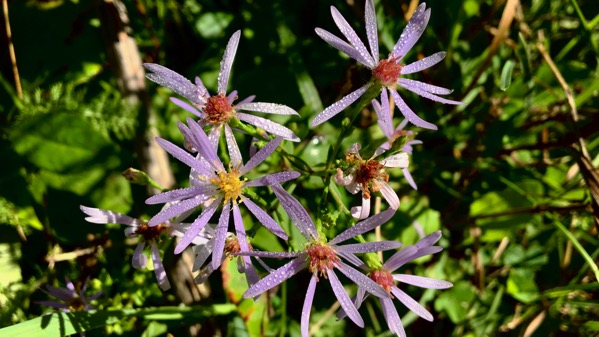
Ah, autumn flowers…Goo_ing suggests that this is a late purple aster. Looks like an aster. Color can accurately be called purple. And it’s late in the season. So, on the surface, I’ll take “late purple aster…” plus the photos match—heehee.
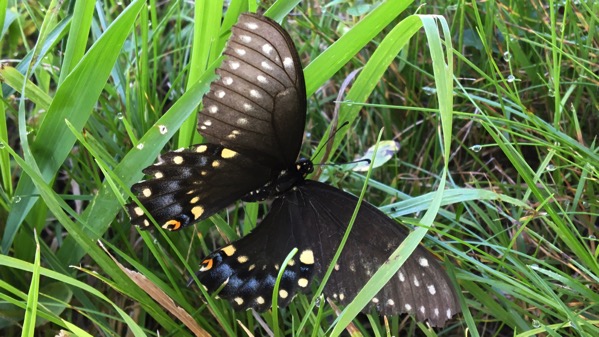
Sorry to those who are not fans of fluttery creatures. I could not tell what was up with this one (fluttering but “stuck” to the plant)…however, I did manage to get a frame of the wings (reasonably) “in focus,” not an easy task!
Stay warm; it’s getting chilly out!
Posted at 9:31 PM |
2 Comments »
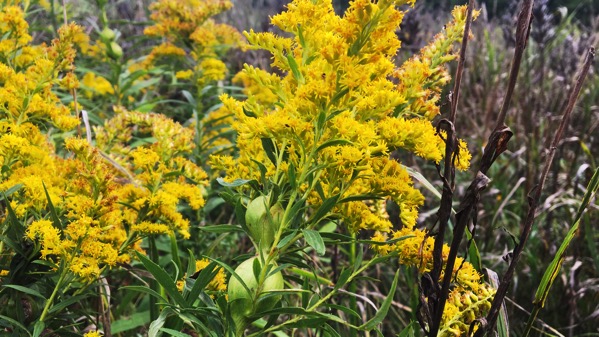
In the fields and open areas, the predominant bloomer during this phase of the season is the goldenrod. Sooooo many times it sports these galls…I forget which insect has deposited the next generation in the stem, and the plant makes the gall around the eggs/whatever.
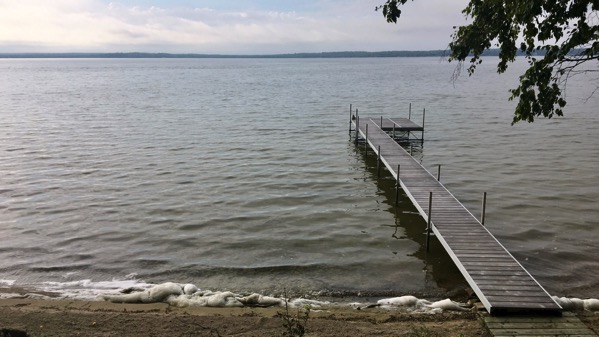
Yesterday’s wind made beach foam!
I wondered if it left us discombobulated leeches, too…only found two small ones…maybe the cycle of life means mostly/only small ones/new crop…. TMI, I’m guessing.
Posted at 9:12 PM |
Comments Off on Small critter stories
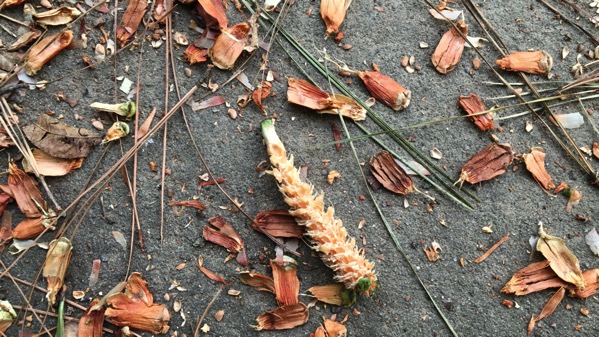
Out and about, I stood under a large pine (mentioned before here) and I was in a rain of cone-parts. Here’s a spent cone amidst conifer detritus.
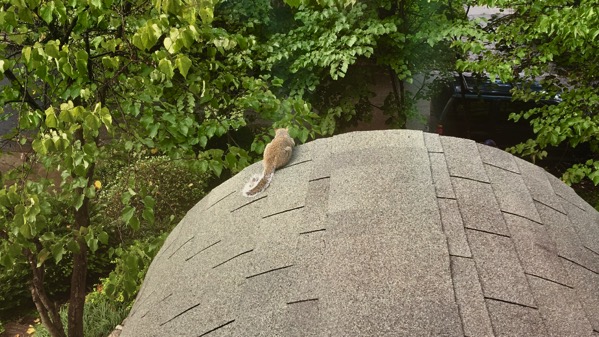
This afternoon, after two brief rain-events (with sunshine between), I spotted this rodent eyeing the street (unfazed by my activities). Is this a belly-cooling pose?
Posted at 6:42 PM |
Comments Off on Cone-i-fih-kay-shun
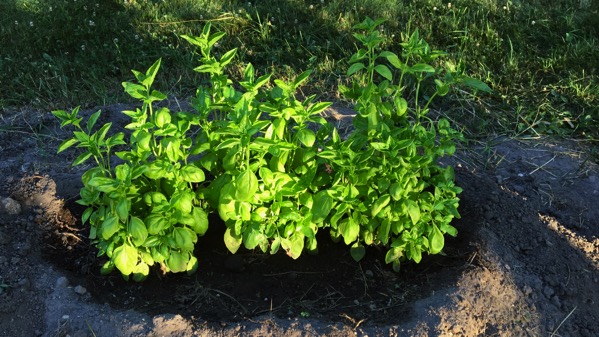
With a generous daily measure of water-added, the basil in the ringfort has been productive.
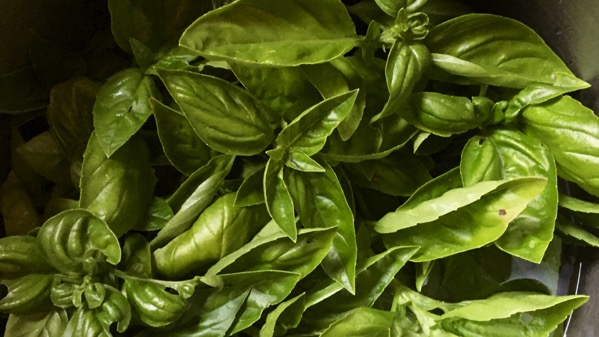
Today we harvested, and the volume was good for a giant dollop of a pesto-like sauce for a big pot of dried tortellini (not to be confused with tortelli or tortelloni…for example).
However, it is so dry weather-wise that unless there’s rain after we leave, these tender plants will NOT make it, and there’ll be no later-season harvest.
Posted at 9:31 PM |
Comments Off on Basil story, NorthCountry 2018
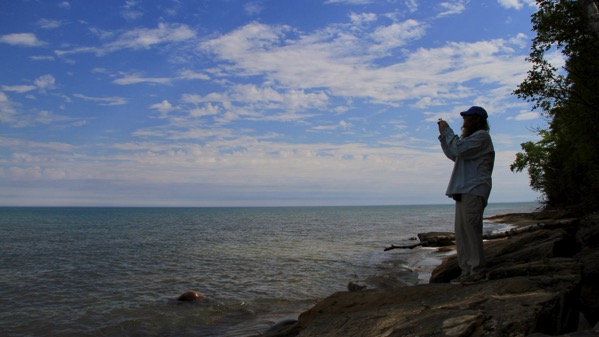
Indeed, the focus of today’s expedition was seeing Lake Superior. That’s me in bug- and sun-resistant clothing. No fashion plate am I. Turns out, today, almost, close-to NO bugs in this area.

There at the mouth of Hurricane Creek we spotted two lampreys. I never remember seeing them in the wilds before. Scarred fish, yes; the critters, no. That brown “ribbon” across the middle of the frame: lamprey.

Instead of our usual return-to-Grand-Marais to lunch, we continued west and dined in a deli-coffee-bookstore in Munising. Yum. Such a lovely place.
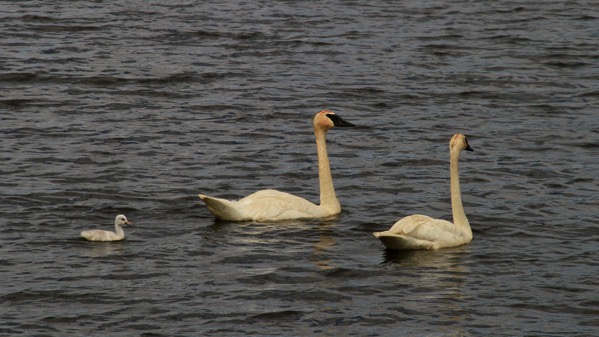
On a lark, we also did the Marshland Tour at the Refuge, and of course saw many Canada geese and swans. Most of the swans were far from the car, but this wee-family was close by. I will not mention the clouds of deer flies that rode on our rear-view mirrors; such a contrast to the near bug-free conditions on the south shore of Gitchee-Gumee.
Posted at 9:31 PM |
Comments Off on Gitchee-Gumee visit
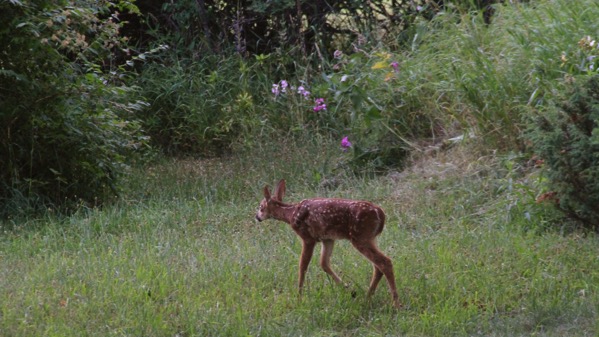
It was getting toward dusk last night when this leetle critter wandered into the yard, no mom in sight…which was disturbing to the critter, who commenced bleating. My interpretation is that the first bleats were “where are you?,” but they soon became “I’m here!” S/he bedded down under Uncle Dave’s maple, and I heard her/him in the night, but not constantly. In the morning we didn’t see her/him and hoped mom had showed up. Then, bleats around 2pm. By dinner time, Mom and the leetle one were bedded down under an apple tree out front. It’s been windy, including overnight, so the sound of the tree-leaves and grasses must have been scary-distracting to the great adventurer.
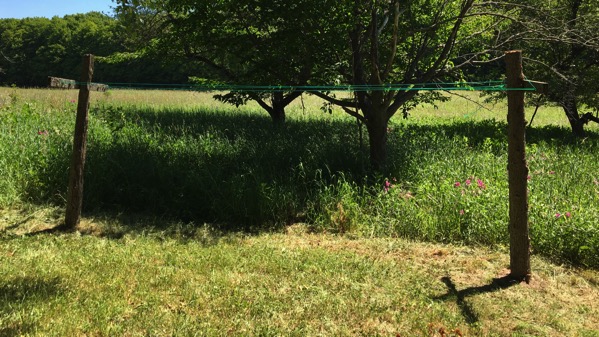
The Guru cut the right post yesterday from the top of the juniper that fell over the winter, and dug the hole and stood it in place today. So, we now have a clothesline again!

This evening we were invited next door to play bocce. Turns out no-one knew the rules, so we made up some. The comely dirty blonde is using a short-ish handled hoe to determine if one of the balls is within that distance of the small target ball (dirty golden, golf-ball sized), and thus the tosser gets a point. Lots of laughing and great difficulty with the uneven and fast surface. But fun!
Posted at 8:59 PM |
Comments Off on Bleater’s story (and more)
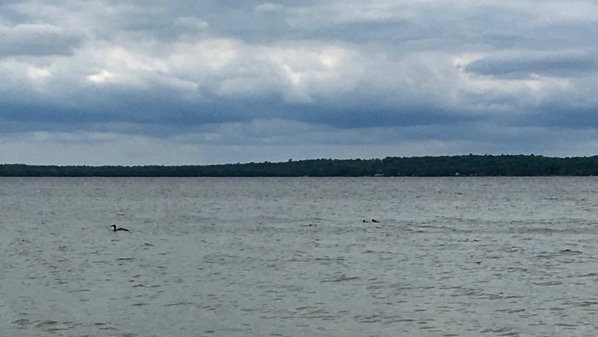
I went down to the lake and shucked off my shoes (and custom orthotics), and set The Foot loose in the wild. I didn’t go out far and I didn’t go under, but when I was floating butt down and digits up, just feeling a mild one-ness with the lake, I watched Lady Loon and her trio of following loon-lets glide by…ah, nature can be so uplifting.
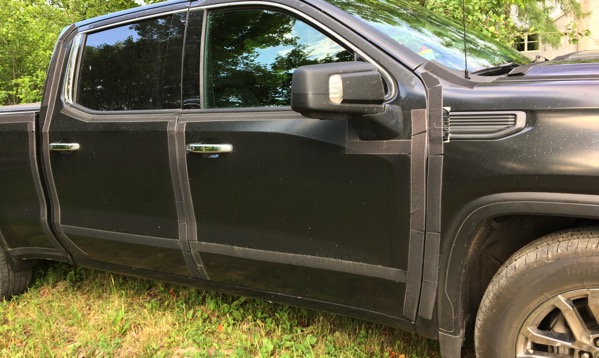
BTW, we aren’t so far out in the sticks that the future doesn’t appear here in one form or another. You may have seen pre-release vehicles, especially if you spend time near Detroit, with a strange black-and-white obfuscation “contact paper” cladding a vehicle to disguise the exact shape should someone see/photograph it. The other option is that the manufacturer sticks panels to the vehicle that cover up the shape beneath—no reconstruction of curves etc. is possible at all. Here’s what the latter vehicle looks like after the panels have been removed, with the not-quite-velcro attachment strips remaining. I’m told this vehicle was shown publicly in March, so there’s no longer any need for disguise.
John was very jealous of the bright red panic button by the dash. Does that tell you something about the state of GM engineering? haha
Posted at 8:31 PM |
Comments Off on Mugginess abates late-day
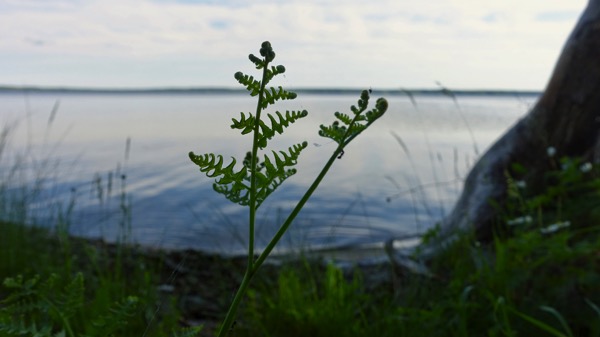
On a quiet evening, a stroll can be so rewarding. The lake was quiet. [Last night we heard a loon.]
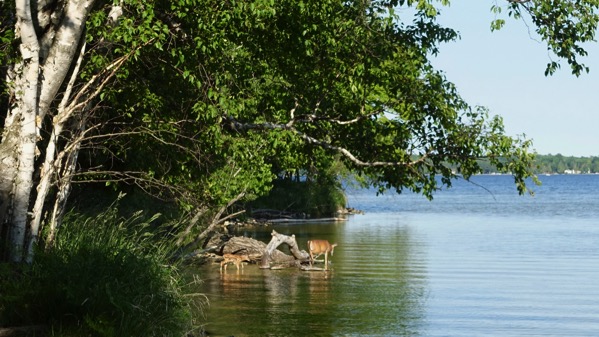
But not too quiet. Doe and fawn also out for a stroll….
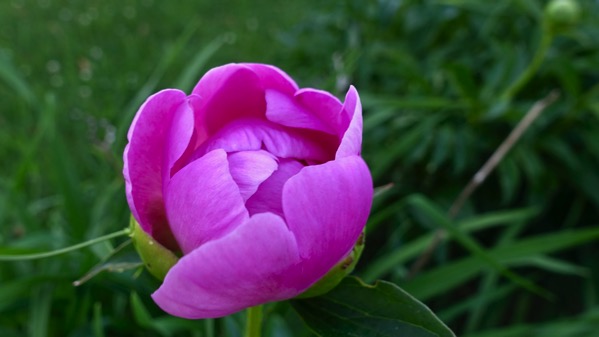
And the peonies are beginning to open. Just yesterday they were closed buds.
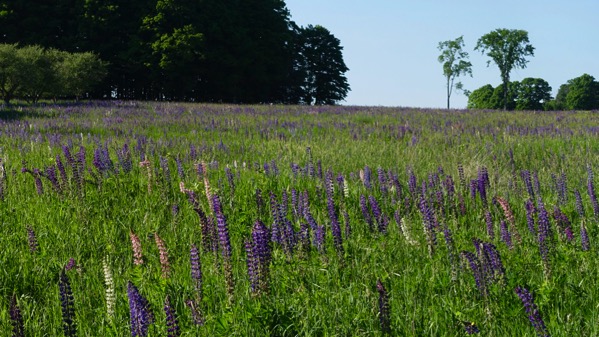
And the lupine field remains gorgeous. Look at the color variation. I think this year my favorites are the dark purple-blue ones and the bicolor variants.
Posted at 6:56 PM |
Comments Off on Evening stroll
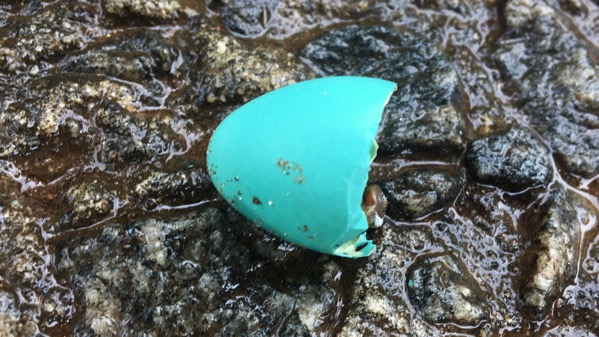
I have no sense of scale, the Guru said about this shell. It was perhaps just over a centimeter long. And under an apple tree (on the sidewalk). I choose to believe that the wind/rain overnight tipped it out of the nest, leaving the already hatched wee-bird safely behind.
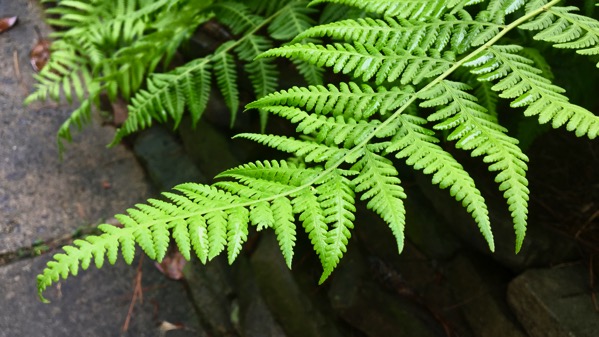
I admit to an outsized attraction to ferniness—not a word, I suppose, but should be! The laciness of ferns is so aesthetically appealing, is it to my reptile brain?
I did not intend to select a pair of sidewalk photos, but that’s what I did. Hmmmm.
Posted at 6:56 PM |
3 Comments »
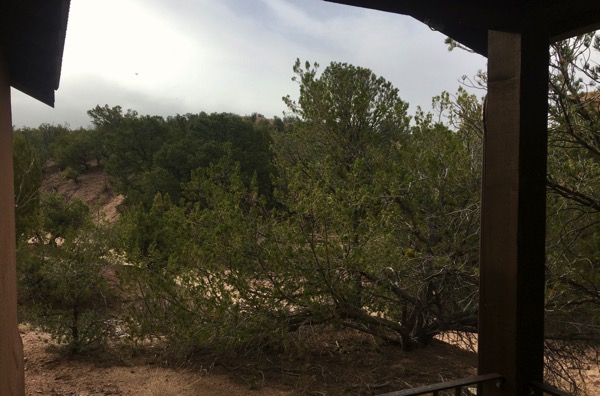
Darn. You can’t tell it’s snowing in the picture, even if you squint. But it was. Lazy drifting flakes. No accumulation. 😎
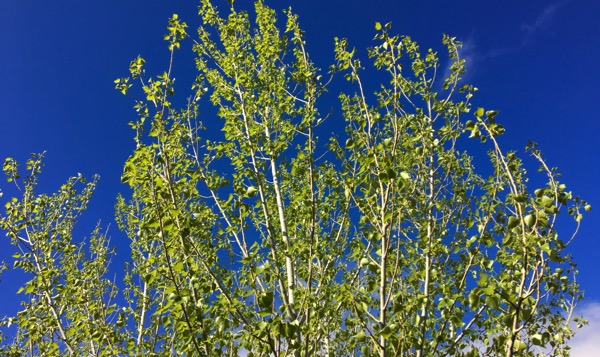
I nosed around outside after I finished my packing—first of suitcases and similar, and then of the car. I wanted to get pictures of the place, memory pictures we call them. I also found clear evidence that the plants have progressed into spring in this not-quite-a-week that we’ve been here. Poplar?
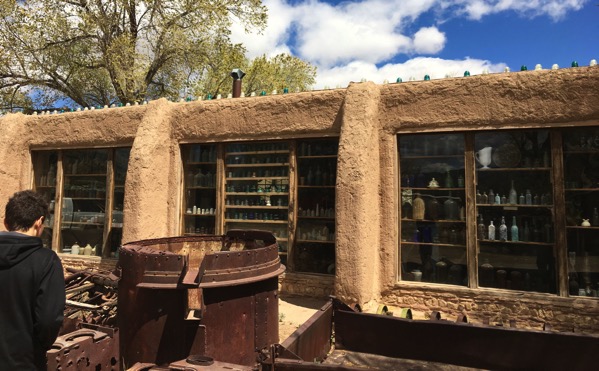
Our first stop was at Cerrillos, a boom town for a bit, and now a grid of unpaved streets. We walked from the visitor center a couple of blocks to this combination rock shop and natural history/history museum. The former was free and the latter $2. We just looked at the rocks.
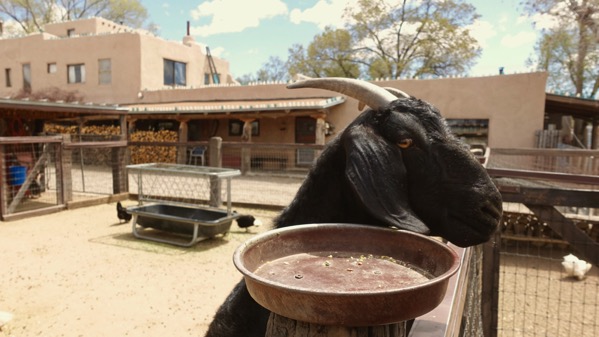
Outside, we checked out the petting zoo, and this aggressive mama-to-be got plenty of happy pats from Nephew #2.

Returning to the car I found this just-opening lilac bush and happily shoved my nose into the bee-free blossoms.

Next stop was the Saturday packed-and-busy former ghost town of Madrid. Perhaps the best thing about the town was this bumper sticker. And that the main road was paved.
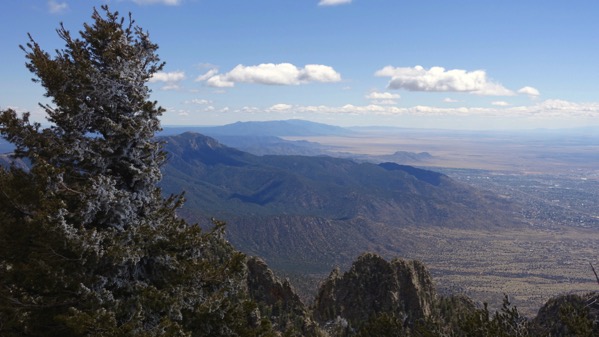
Our final sight-seeing stop was for us a return visit to Sandia Crest. Still ice on a few of the trees, but the wind wasn’t so stiff and the temp was much higher. We shared our watermelon (of course!) snack with other folk in the parking lot, then rebounded to descend to the city.
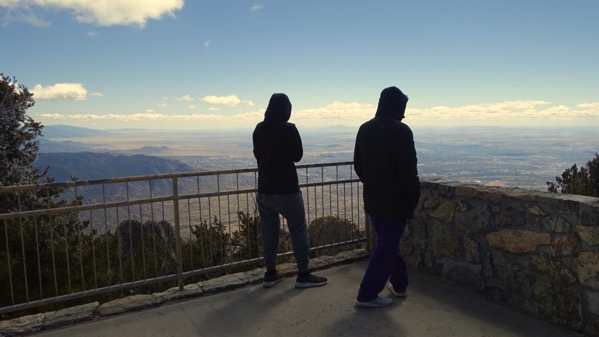
I think the nephews enjoyed the view. Down in ABQ, we said our goodbyes and they headed to the airport while we headed for first-class down time. Sigh. Such good times, with many laughs and a great week of getting reacquainted. Great weather, some fine food…. Lucky us.
Posted at 9:12 PM |
Comments Off on Snow; yes, snow






























